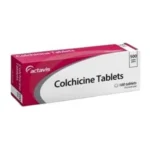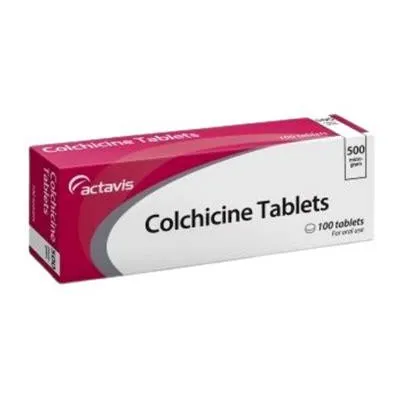Description
Ingredients
- Active Ingredient: Colchicine
- Inactive Ingredients: These may include excipients like lactose, microcrystalline cellulose, magnesium stearate, and other substances depending on the tablet formulation.
Side Effects
Generally, people tolerate colchicine well, but like all medications, it can cause side effects. Common side effects include:
- You may experience gastrointestinal symptoms, like nausea, vomiting, diarrhea, or stomach cramps.
- Fatigue or feeling unusually weak.
- Headache.
- Loss of appetite.
Serious side effects, although rare, can include:
- Serious gastrointestinal distress, like persistent vomiting or diarrhoea, may lead to dehydration.
- Muscle weakness, cramps, or pain could be signs of muscle damage.
- The suppression of bone marrow results in a decrease in white blood cells, which can lead to frequent infections; red blood cells, which can cause anaemia; and platelets, which can lead to easy bruising or bleeding.
- Liver issues, such as jaundice (yellowing of the skin or eyes) or severe abdominal pain, can occur.
- There is numbness or tingling in the hands or feet.
If you experience any of the serious side effects, contact your doctor immediately.
Warnings
- Kidney or liver disease: If you have kidney or liver problems, your doctor may need to adjust your dose of colchicine or closely monitor your condition during treatment.
- Pregnancy and breastfeeding: It’s important to use colchicine only when absolutely necessary, as its safety during breastfeeding remains uncertain. Discuss with your doctor if you are pregnant, planning to become pregnant, or breastfeeding.
- Drug interactions: Colchicine can interact with other medications, such as certain antibiotics, antifungals, and drugs that affect liver enzymes. Inform your doctor about all the medications you are currently taking, including over-the-counter drugs and herbal supplements.
- Avoid dehydration: Colchicine can cause dehydration, especially when combined with excessive diarrhoea or vomiting. Ensure you drink plenty of fluids and avoid situations where dehydration might occur.
- Alcohol: Avoid drinking excessive amounts of alcohol while taking colchicine, as it can increase the risk of side effects like gastrointestinal issues or liver problems.
FAQs About Colchicine
How long does it take for colchicine to work?
Colchicine generally starts working within a few hours to a couple of days for gout attacks. However, the full benefit may take several days to manifest. Long-term use in preventing attacks may result in a longer time to feel the effects.
Can I drink alcohol while taking colchicine?
It is advisable to avoid excessive alcohol consumption while on colchicine, as it can increase the risk of gastrointestinal side effects and liver damage. Discuss your alcohol consumption with your doctor for tailored advice.
What should I do if I miss a dose of colchicine?
If you miss a dose, take it as soon as you remember, unless it is almost time for your next dose. Never take two doses to make up for a missed one. If you’re unsure, it’s best to consult your doctor or pharmacist.
Is colchicine safe to use during pregnancy?
Only use colchicine during pregnancy if the benefits outweigh the risks. Contact your doctor if you’re pregnant or planning to become pregnant.
Is it possible to use colchicine for conditions other than gout?
Yes, doctors also use colchicine to treat Familial Mediterranean Fever (FMF) and may prescribe it off-label for other inflammatory conditions. Always follow your doctor’s guidance when using colchicine.
Can I take colchicine with other medications?
Colchicine may interact with certain other medications, including antibiotics, antifungals, and drugs that affect the liver. Always inform your doctor about any other medications you are taking, including over-the-counter medicines and supplements.
This content provides a comprehensive overview of colchicine, its uses, and necessary precautions. Let me know if you need further details!



Reviews
There are no reviews yet.